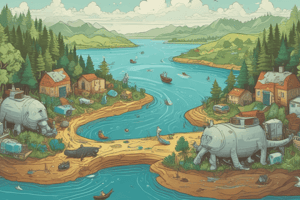Podcast
Questions and Answers
What is the main effect of water pollution on the environment?
What is the main effect of water pollution on the environment?
- It increases the oxygen levels in the water
- It reduces the temperature of the water bodies
- It maintains the balance of the ecosystem
- It alters the balance and causes potential damage (correct)
Which of the following is NOT a main water pollutant?
Which of the following is NOT a main water pollutant?
- Oxygen (correct)
- Pharmaceutical products
- Viruses
- Fertilizers
What is the purpose of chemical analysis of small water samples and aquatic organisms?
What is the purpose of chemical analysis of small water samples and aquatic organisms?
- To increase the oxygen levels in the water
- To remove pollutants from the water
- To determine the status of water quality (correct)
- To identify the sources of water pollution
What is an example of a point source of water pollution?
What is an example of a point source of water pollution?
Why is it often difficult to identify the source of water pollution?
Why is it often difficult to identify the source of water pollution?
What is an example of natural pollution of a body of water?
What is an example of natural pollution of a body of water?
What is the main indicator used to determine if a water source is polluted?
What is the main indicator used to determine if a water source is polluted?
What is a consequence of surface water pollution?
What is a consequence of surface water pollution?
What type of water pollution occurs when pollutants enter rivers, lakes, or seas?
What type of water pollution occurs when pollutants enter rivers, lakes, or seas?
Why is it easier to pollute surface water bodies?
Why is it easier to pollute surface water bodies?
What is the primary reason for treating polluted water before using it in agriculture?
What is the primary reason for treating polluted water before using it in agriculture?
What makes groundwater pollution more difficult to detect compared to surface water pollution?
What makes groundwater pollution more difficult to detect compared to surface water pollution?
What is the primary difference between direct and diffuse pollution of groundwater?
What is the primary difference between direct and diffuse pollution of groundwater?
What is a characteristic of groundwater movement that affects the prevention, monitoring, or elimination of contamination?
What is a characteristic of groundwater movement that affects the prevention, monitoring, or elimination of contamination?
What is a source of groundwater pollution that is not typically associated with surface water pollution?
What is a source of groundwater pollution that is not typically associated with surface water pollution?
Flashcards are hidden until you start studying
Study Notes
Water Pollution Definition
- Water pollution occurs when non-water substances are introduced and accumulate in water, causing potential imbalance and damage to the environment.
- Polluted water becomes unusable for drinking, human use, agriculture, and livestock.
Main Water Pollutants
- Bacteria
- Viruses
- Parasites
- Fertilizers
- Pesticides
- Pharmaceutical products
- Nitrates
- Phosphates
- Plastics
- Fecal waste
- Radioactive substances
Sources of Water Pollution
- Point Sources: pollution occurs from a single, identifiable source (e.g., oil spill, pipe discharge).
- Non-Point Sources: pollution occurs over a wide area with many possible sources (e.g., town, industries, agricultural area).
- Natural Sources: pollution caused by natural phenomena or processes (e.g., animal death, volcanic eruption).
- Anthropogenic Sources: pollution caused by human activities (e.g., hospital wastewater, industrial waste).
Types of Water Pollution
- Surface Water Pollution: alteration of surface water bodies through harmful substances.
- Groundwater Pollution: introduction of substances that alter the original composition of groundwater.
Surface Water Pollution
- Occurs in accessible water bodies (e.g., rivers, lakes, seas, oceans).
- Easy to pollute, but easier to detect and remedy.
- Anthropogenic sources include domestic wastewater, industrial wastewater, livestock wastewater, and agricultural wastewater.
- Pollutants include organic matter, pathogens, heavy metals, pharmaceuticals, hydrocarbons, and nutrients.
- Effects include decreased dissolved oxygen, increased turbidity, sedimentation, eutrophication, and expansion of pathogen bacteria.
Groundwater Pollution
- Occurs in underground water bodies.
- Difficult to pollute, but harder to detect and remedy.
- Characteristics include diverse origins, high distribution, localized or large areas of contamination, and slow movement.
- Sources include septic tanks, oil tanks, and agricultural activities.
- Risks for life are similar to surface water, excluding eutrophication.
Studying That Suits You
Use AI to generate personalized quizzes and flashcards to suit your learning preferences.




